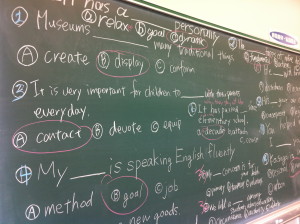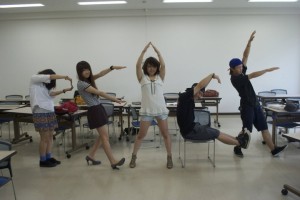Making Classrooms Everywhere Matter More – Chuck Sandy

Last year when still working at the university I was working at then, I began spending my entire day sitting outside with students. My workstation was a park bench. I’d sit there talking with whoever came, sometimes helping with homework, but often just listening to students as they’d tell me about problems they were having in their lives. When it was time for one of my classes, I’d gather my students together and we’d head inside to spend ninety minutes in a traditional classroom. When class was over, we’d head back outside and the learning continued. People would come and go, but I began thinking of that bench as the non-stop classroom. Great things happened there: thesis topics were discovered, new directions were found, hearts got mended, complaints got heard, and when one student we all loved was killed in a motorcycle accident, grief was acknowledged and shared. I learned as much as I taught. The thing is, at that moment in my teaching career, and for lot of different reasons, I’d lost the support of most of my colleagues at the university and had no local professional community. Looking back, I see those days on the park bench as one of the most rewarding periods of my life as a teacher. Still, I doubt I would have realized this as quickly as I have had it not been for the global community of connected teachers: people like you who helped me see that my work mattered.

Long ago, my teacher, the poet Cid Corman, modeled this kind of teaching for me by quitting his job at a famous university and taking up daily residence in a Kyoto coffee shop. Cid would sit there from 10 AM till 5 PM five days a week, welcoming whoever came to learn with a big smile followed by his warm, undivided attention. I was one of those people, and one of the things Cid taught me was that a classroom doesn’t need to be in a school nor does being a teacher mean working in a classroom. What’s important, said Cid, is community and feeling valued by that community. In addition to learners like me, Cid’s community was the worldwide community of poets who in those days supported each other via airmailed letters. Those letters connected him the way the internet connects me.

I was thinking about all this recently when I came across an old post I’d written for Eltnews and rediscovered an activity I’d done with my students, one where I’d asked them to tell me about their favorite and least favorite classrooms and allowed them the freedom to say anything. Here’s some of what they came up with that day:
In my favorite classroom …
We get to talk about interesting stuff.
Everyone laughs a lot and has fun.
The teacher listens to me.
I feel excited and I learn a lot.
I’m happy being there.
In my least favorite classroom …
The mood is not good.
The teacher talks all the time.
We use computers all the time in a boring way.
It has nothing to do with my life.
I don’t have any friends there.
Clearly, what was important to those students was not the classroom itself, but rather how they felt about being there. No matter where students learn and teachers teach, they need to feel welcome, challenged, connected, and valued. This can happen anywhere, no fancy classroom or even school required. What is required though is support from a community, and increasingly, the only support that can be readily found is from the online community of connected educators around the world: people like you.
Not long ago I got a Facebook message from a teacher friend in Syria letting me know that he and some colleagues had set up a school in a refugee center. They worked in the most basic of classrooms with learners living in the most basic of conditions. He wrote on his Facebook page that working with children there was like taking a course in innocence where the first lesson he taught was “though I live in the hardest of life conditions, I can still find a reason to smile.” Although I’ve only met this teacher once, he’s an important person to me. Today, I learned he’d been accepted into an MA program at a good university abroad. When I heard, I felt his joy.

 In Indonesia, I met an iTDi member whose father is also a teacher. She told me her father walks jungle paths and across a river each day to meet his students in a village school with dirt floors and no electricity. Although his classroom has nothing, he works to connect students with the world, teaching English as a way out and forward. He believes that as a teacher, his role is to open doors that would otherwise be invisible to his students. His teacher daughter believes she can change the world. I believe it, too. She’s now active on social media and is an edu-blogger. Daily she’s empowered by the teachers she’s met online through iTDi and elsewhere.
In Indonesia, I met an iTDi member whose father is also a teacher. She told me her father walks jungle paths and across a river each day to meet his students in a village school with dirt floors and no electricity. Although his classroom has nothing, he works to connect students with the world, teaching English as a way out and forward. He believes that as a teacher, his role is to open doors that would otherwise be invisible to his students. His teacher daughter believes she can change the world. I believe it, too. She’s now active on social media and is an edu-blogger. Daily she’s empowered by the teachers she’s met online through iTDi and elsewhere.
Back in the 1930s my grandmother taught in a one-room schoolhouse where students wrote with chalk on slate tablets, sat on hard wooden benches, shared textbooks, and studied by lamplight. Still something magical must have happened in that room because when she passed away at 99 many of her former students, then senior citizens themselves, came to her funeral to tell stories about how what they’d learned in that little schoolroom with my grandmother had changed their lives and how the local community was centered around what happened in that school.

Learning and teaching can happen in one-room schools, in refugee camps, at village schools in jungles, on park benches, over coffee in coffee shops, or in completely wired classrooms at the most up-to-date schools. It doesn’t matter where it happens. It only matters that it does happen and that all teachers have community support. Today, the local community of my grandmother’s day is gone. Today, that community is you, reading this.
If the sky was the limit, and it is, I would put far less emphasis on classrooms and focus resources and energy on teacher development. I would work to get all teachers everywhere connected while helping teachers everywhere understand that the work they do matters, that they are valued, that we’re all in this together and that it will only be by joining hands and supporting each other that we’ll make classrooms everywhere matter more. In fact, this is the work I do, and it’s why I work with iTDi.
Connect with Chuck and other iTDi Associates, Mentors, and Faculty by joining the iTDi Community. Sign Up For A Free iTDi Account to create your profile and get immediate access to our social forums and trial lessons from our English For Teachers and Teacher Development courses.
Like what we do?
Become an iTDi Patron.
Your support makes a difference.













 For several years, I’d finish classes and head to Ginza to wander the streets. I can honestly say that I’ve never been lost in Ginza– until this morning.
For several years, I’d finish classes and head to Ginza to wander the streets. I can honestly say that I’ve never been lost in Ginza– until this morning. I’m reading a book called The Untethered Soul by Michael A. Singer. In this book, Singer writes about the voice inside all of us, about how that voice can get us to believe it is who we are and is reality itself. It’s not. “What voice?” I can hear you asking. Say the word “hello” silently in your mind. Make your inner voice say “hello” several times. Hear that? That voice. Make it shout “hello” inside yourself. Make it say, “I’m not good at ______.” No, stop. Don’t complete that sentence. Make the voice say, “I’m really good at ______. Complete the sentence in different ways. Listen to yourself. Now, think about this.
I’m reading a book called The Untethered Soul by Michael A. Singer. In this book, Singer writes about the voice inside all of us, about how that voice can get us to believe it is who we are and is reality itself. It’s not. “What voice?” I can hear you asking. Say the word “hello” silently in your mind. Make your inner voice say “hello” several times. Hear that? That voice. Make it shout “hello” inside yourself. Make it say, “I’m not good at ______.” No, stop. Don’t complete that sentence. Make the voice say, “I’m really good at ______. Complete the sentence in different ways. Listen to yourself. Now, think about this.